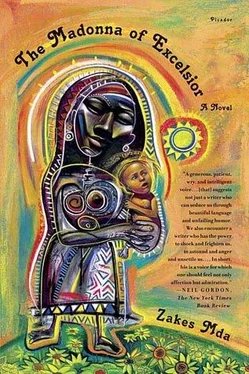“You of all people have the cheek to trespass on my farm,” shouted Johannes Smit. And he released the leashes.
The dogs attacked. She tried to run. But they grabbed her brown seshweshwe dress with their teeth and ripped it off. She fell on the ground. She swallowed her screams as the dogs tore into her legs and arms. She was going to die in silence. She was not going to give Johannes Smit the satisfaction of hearing her beg for mercy.
When he thought he had given her a lesson she would never forget, he grabbed the leashes, pulled his dogs back and walked away. Niki stood up, brushed the soil from her tattered dress and limped home, leaving the bag of gleanings on the ground. She was almost naked, and her legs and arms were bleeding.
“What happened, Niki?” asked Popi.
“Who did this to you, mama?” asked Viliki.
“Tjaart is going to be a soldier,” said Niki, as if to herself.
“Tjaart Cronje? Does he have anything to do with this?” demanded Viliki.
“They are going to kill Tjaart,” said Niki.
“Who cares about Tjaart?” cried Popi. “What happened to you, Niki?”
“You must be nice to Tjaart,” said Niki pleadingly. “Especially you, Popi. God would like you to be nice to Tjaart.”
Popi did not understand why God would like her to be nice to Tjaart Cronje. She warmed water on the Primus stove and washed her mother’s wounds with Sunlight soap.
19. RITES OF PASSAGE: VILIKI GOES SOLDIERING
THIS is the earth-colour period. Browns and yellow ochres. Siennas: burnt and raw. Diffusing their warmth into the world. Burnt umbers. A yellow ochre man on a yellow ochre bicycle. Burnt umber face under a yellow ochre conical Basotho hat. Pedaling barefoot across the yellow ochre ground. Unusually thin outlines, almost buried by the yellow ochre. There is a dead bird on the front carrier of his bike. A red goose. Women accompany him on foot. Yellow ochre women with burnt umber faces walking on the yellow ochre earth in their yellow ochre slippers. Three women, each one with a burnt sienna goose on her head. One holding a closed burnt umber umbrella. They have left the dark-roofed yellow ochre houses a distance away, on the yellow ochre horizon. They carry their geese obligingly under a yellow ochre sky.
They came all the way from Thaba Nchu with sacrificial poultry. Relatives of Niki’s. They came to celebrate Popi’s passage into the ranks of the Young Women’s Union of the Methodist Church. The vibrant songs of the Methodists had drawn her into their fold, away from her family’s Dutch Reformed Church in Afrika, the black version of the Reverend François Bornman’s Nederduits Gereformeerde Kerk or NGK — the true Dutch Reformed Church of the Afrikaner people. The Methodists held lively vigils that had captivated Popi. She had, in turn, captivated the Methodists with her voice, which reverberated against the walls of the whitewashed red-roofed church every Sunday morning. When she sang, her listeners forgot that she was the despised boesman girl, and thanked God for lending her the voice of angels.
She had learnt her scriptures well. And had passed the tests. Today she was wearing the young women’s uniform for the first time. A black skirt, a white blouse, a red bib and a white hat. She stood in front of the rose-bush proudly as well-wishers congratulated her. Women of the Mothers’ Union had invaded her home, to the discomfort of Niki. The front of her yard had turned colourful with their uniform of black skirts, red tops with white collars and white hats.
Her children often made it impossible for her to keep to herself. Their activities occasionally brought unwelcome guests. But she was proud of Popi for graduating into the union. And was secretly pleased that the relatives from Thaba Nchu had used the occasion as an excuse to visit her, and to find out what was happening with her. It showed that they still cared. And that they had accepted Popi. Even though at first they had kept their distance from Niki. And had said that they would have nothing to do with a woman who had brought so much shame to their family. And when she had posed naked for the trinity, and they had heard rumours to that effect, her fate had been sealed. They had said the habit of stripping for white men had been so deeply imbedded in her that she was not even ashamed to display her nakedness within God’s own premises. This Catholic priest who painted women, they had wondered among themselves, why was he interested in Dutch Reformed and in Methodist women? If he was true to his calling, wouldn’t he be interested only in the nakedness of Roman Catholic women?
The relatives from Thaba Nchu were extending a hand of reconciliation. The uncle with a bicycle and three aunts had walked all the way from Thaba Nchu, with their provisions of live birds. The uncle had walked because he could not cycle away and leave the women to walk alone.
Now a big three-legged pot was steaming with the curried poultry they had brought to celebrate Popi’s passage. Another pot was steaming with beanless samp. Women of the Mothers’ Union were going to feast. So would Popi’s fellow graduands. And then everyone would go to their homes, and leave Niki in peace.
The only sadness in Popi was that Viliki was not there to celebrate with her. He had bought her the uniform and left. He had this tendency to disappear for days on end. And no one knew where he was. No one but Popi, for after she had pestered him enough, he had confided in her about his activities. He had joined the guerrilla forces, those who were fighting to liberate South Africa from the oppression of the Boers. He was working for the underground political Movement.
Popi wondered what a political Movement was doing under the ground, and how Viliki happened to get there. She imagined him digging tunnels like a mole. The underground he was talking about, he explained, was in Lesotho. He crossed the Caledon River every week to smuggle out young men and women who were going to join the forces of liberation. Young men and women who came from all over South Africa, and were directed to his conduit by cell leaders. He took them across the river where he introduced them to his contact in Maseru — the only guerrilla leader he met. From there, some of them would be smuggled out of the country for military training, after which they would be infiltrated back to cause havoc to the enemy.
“Niki will kill you if she finds out this is what you do,” Popi had warned.
“Of course she will never find out,” Viliki had said confidently. “You are too smart to tell her. You are too smart to tell anybody. Unless you want the police to come crawling all over the place.”
“What about Sekatle? Doesn’t he know? Do you trust him?”
“No, I don’t trust him,” Viliki had said. “That is why he does not know. That is why you don’t see me walking around with him any more. Sekatle has joined the system.”
That meant that Sekatle was working for those Viliki was fighting against. And in Excelsior they were represented by Adam de Vries and his party machinery. Klein-Jan Lombard and his police outfit. Tjaart Cronje and his military apparatus. The Reverend François Bornman and his guardianship of the ultimate truth. Even Johannes Smit and his Brahmins and tracts of land that were as big as a small country. The more we saw Sekatle in the company of some of these people, the more his material situation seemed to change for the better. He even drove a bakkie. We never really understood how he could afford it just by taking photographs. Even Maria’s house transformed before our eyes from a corrugated-iron shack to a brick house. Suddenly she lived like a princess. And the good life trickled down to Mmampe. Undoubtedly it would have trickled down to Niki as well, if she had not decided to eschew the company of good friends with whom she had been through so much!
Читать дальше












